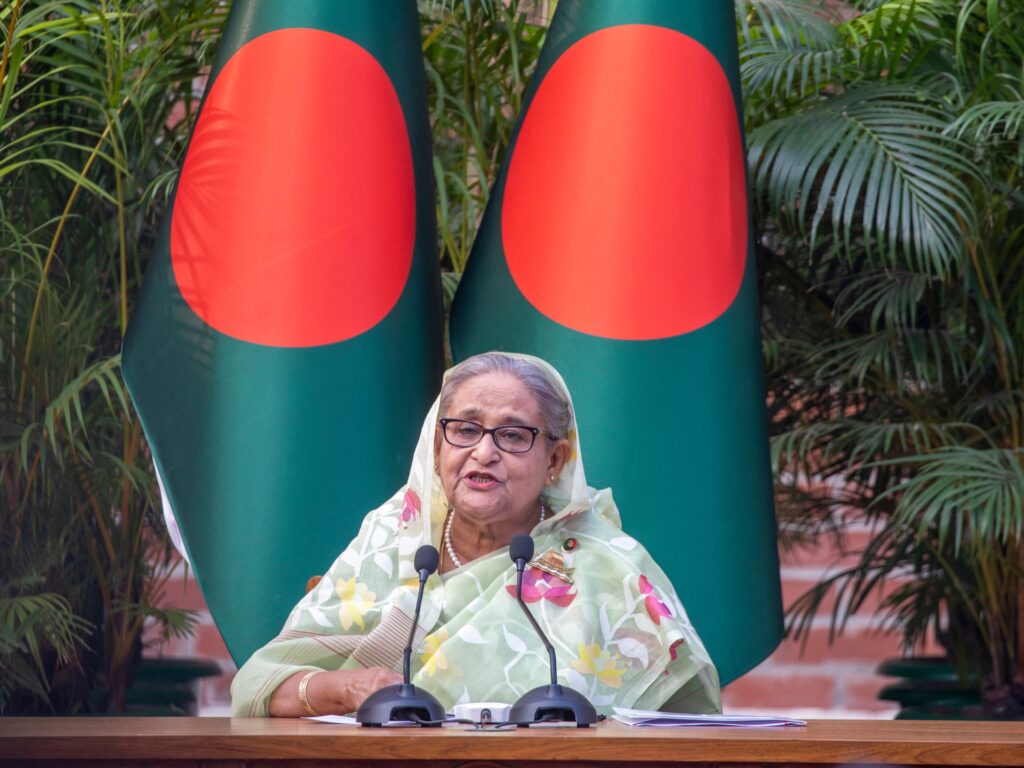Worldwide Crimes Tribunal says it should begin the method to deliver expelled chief again to reply for ‘massacres’.
Bangladesh’s Worldwide Crimes Tribunal (ICT) says it’s taking steps to safe the extradition of ousted chief Sheikh Hasina from neighbouring India.
The chief prosecutor of the physique stated on Sunday that the authorized course of to deliver Hasina again to Bangladesh, to face trial for the lethal violence waged by the authorities earlier than she was unseated by mass protests in August, has began.
Following weeks of protests and a vicious crackdown by authorities, Hasina fled by a military helicopter on August 5 and landed at an airbase close to New Delhi looking for refuge. Her presence in India has affected relations between Dhaka and New Delhi, and a diplomatic dispute is feasible as Bangladesh strikes to deliver her again to face trial.
Mohammad Tajul Islam, the ICT’s chief prosecutor, stated Hasina, accused of ruling the nation with an iron fist throughout her 15-year reign, is being searched for her function in overseeing “massacres” through the rebellion.
“As the primary perpetrator has fled the nation, we’ll begin the authorized process to deliver her again,” he informed reporters.
“Bangladesh has a prison extradition treaty with India which was signed in 2013, whereas Sheikh Hasina’s authorities was in energy,” Islam added.
“As she has been made the primary accused of the massacres in Bangladesh, we’ll attempt to legally deliver her again to Bangladesh to face trial.”
The ICT was arrange by Hasina in 2010 to analyze atrocities through the 1971 warfare of independence from Pakistan.
Diplomatic pressure
Accused of widespread human rights abuses, together with the mass detention and extrajudicial killing of her political opponents, Hasina’s authorities was introduced down as weeks of student-led demonstrations escalated into mass protests.
Greater than 600 folks had been killed within the weeks main as much as Hasina’s ouster, based on a preliminary United Nations report, suggesting the demise toll was “probably an underestimate”.
Hasina, 76, has not been seen in public since fleeing. Dhaka has revoked her diplomatic passport.
A clause within the extradition treaty between the 2 nations states that extradition is likely to be refused if the offence has a “political character”.
Nonetheless, Bangladeshi officers have made it clear that Dhaka will push arduous to deliver the deposed chief again to face justice.
Interim chief Muhammad Yunus, a Nobel Peace Prize winner who took over after the rebellion, final week stated Hasina ought to “maintain quiet” whereas exiled in India till she is introduced residence for trial.
“If India needs to maintain her till the time Bangladesh needs her again, the situation could be that she has to maintain quiet,” Yunus informed the Press Belief of India information company.
His authorities is below important public strain to demand her extradition, with anti-India sentiment rising among the many wider inhabitants in Bangladesh.
The final secretary of the primary opposition Bangladesh Nationalist Party (BNP), Mirza Fakhrul Islam Alamgir, informed Indian media that Hasina should be tried in Bangladesh.
The strain has put India in a difficult place and soured relations between New Delhi and Dhaka.

